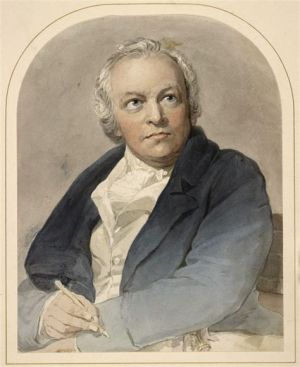William Blake: Difference between revisions
No edit summary |
The Admins (talk | contribs) (style) |
||
| (One intermediate revision by one other user not shown) | |||
| Line 1: | Line 1: | ||
'''William Blake''' | [[File:Wmblake.jpg|thumb|William Blake]] | ||
'''William Blake''' (28 November 1757 — 12 August 1827) was a poet and painter who went largely unrecognized during his lifetime, but is now considered a seminal figure in the artistic, literary, musical and intellectual movement known as Romanticism<ref>[https://en.wikipedia.org/wiki/Romanticism Wikipedia on Romanticism.]</ref> or the Romantic age/ara. In the poem “A Little Girl Lost” (1794), he envisages a future where children and adolescents will freely enjoy nudity and love, and the religious condemnation of these pleasures will cause indignation. Blake provided a timeless perspective on love: | |||
<blockquote> | |||
''Children of the future age,'' | ''Children of the future age,'' | ||
| Line 9: | Line 12: | ||
''Love! sweet Love! was thought a crime.'' | ''Love! sweet Love! was thought a crime.'' | ||
from Songs of Experience. | '''"A Little Girl Lost,"''' from ''Songs of Experience'' (1794).<ref>[https://agapeta.art/2019/06/18/a-little-girl-lost-by-william-blake/ Full poem and links on Agapeta]</ref> | ||
</blockquote> | |||
[http:// | The above lines form the famous ending of 1st wave [[MAP_Movement|MAP Movement]] scholar-activist [[Thomas O'Carroll|Tom O'Carroll]]'s book, ''Paedophilia: The Radical Case''<ref>[http://www.ipce.info/host/radicase/preface.htm Ipce: Paedophilia: The Radical Case]</ref> (1980). | ||
Also see his poem ''The Garden of Love'' (1794)<ref>[https://agapeta.art/2023/02/12/the-garden-of-love-by-william-blake/#more-3070 The Garden of Love]</ref>. | |||
==See also== | ==See also== | ||
<div style="column-count:3;-moz-column-count:3;-webkit-column-count:3"> | |||
*[[Lord Byron]] | *[[Lord Byron]] | ||
*[[Oscar Wilde]] | *[[Oscar Wilde]] | ||
| Line 29: | Line 35: | ||
*[[Mark Twain]] | *[[Mark Twain]] | ||
*[[Uranian Poetry]] | *[[Uranian Poetry]] | ||
</div> | |||
==External links== | |||
*[http://en.wikipedia.org/wiki/William_Blake Wikipedia Article] | |||
==References== | |||
[[Category:Official Encyclopedia]][[Category:People]][[Category:People: Artists and Poets]][[Category:People: British]][[Category:People: Deceased]][[Category:Art]] | [[Category:Official Encyclopedia]][[Category:People]][[Category:People: Artists and Poets]][[Category:People: British]][[Category:People: Deceased]][[Category:Art]] | ||
Latest revision as of 12:26, 6 March 2023

William Blake (28 November 1757 — 12 August 1827) was a poet and painter who went largely unrecognized during his lifetime, but is now considered a seminal figure in the artistic, literary, musical and intellectual movement known as Romanticism[1] or the Romantic age/ara. In the poem “A Little Girl Lost” (1794), he envisages a future where children and adolescents will freely enjoy nudity and love, and the religious condemnation of these pleasures will cause indignation. Blake provided a timeless perspective on love:
Children of the future age,
Reading this indignant page,
Know that in a former time,
Love! sweet Love! was thought a crime.
"A Little Girl Lost," from Songs of Experience (1794).[2]
The above lines form the famous ending of 1st wave MAP Movement scholar-activist Tom O'Carroll's book, Paedophilia: The Radical Case[3] (1980).
Also see his poem The Garden of Love (1794)[4].
See also